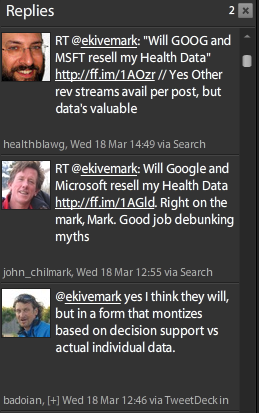There is just over a week until HealthCampPhila kicks off on Saturday 28th March at Jefferson University. There may be a few tickets and sponsor slots left - check on eventbrite for the latest status (http://healthcampphila.eventbrite.com).
The event is primed to generate some fascinating discussion. If you are planning on attending the event then do come up and say hi!
On a separate note I wanted to follow up on my last post where I addressed the issue "Will Google and Microsoft resell my health data?" This question caused some re-tweeting and commenting on Twitter.

I want to thank David Harlow (@Healthblawg) for creating a "connect the dots" moment for me. His comment about health data being valuable took me back to posts I wrote over a year ago for AOL when I was considering OpenID, AIM, identity and portable reputation. The investment that we have made in instant messenger screen names that we have held for years represents a powerful element in building identity. However, that identity is virtual. The PHR is different.
The Ahah! moment for me was the realization that as Microsoft and Google enable us to store our health data they are in fact creating an incredibly valuable tool for trusted and credentialed identity.
Think about this. Facebook is creating a trusted identity system based upon our use of real names and the verification that a circle of friends know us. The online Personal Health Record (PHR) is subtly different from the trusted Facebook identity. The online PHR is being built with data linkages in mind. It is a resource that is, or will be, incredibly rich in transaction and linkage data based upon real world encounters. The PHR becomes like an online fingerprint.
What Google and Microsoft are building is a mechanism that they could leverage to validate that the person behind a LiveId or google health account is really the person that they say they are. This is not a binary true or false value, it will instead be a variable level of certainty - A level that is based on the depth of real world encounter information such as clinical history, claims information, family history and other data collected in the record and the number of authenticated touch points that link to the PHR.
Google and Microsoft could get incredible value from this information. Not from selling the information. Not from analyzing the information to push more ads. No, the value could come from the fact that this pool of data could become more valuable than our credit histories. The difference between the PHR and our credit history is that we, as consumers, have control over our PHR but only visibility in to our credit history.
Without releasing any contextual data about us Google and Microsoft could create the equivalent of a credit score that represents the level confidence in the authenticity of an account.
With the PHR sitting firmly at the intersection of the real and electronic world it is no wonder that these two giants are locked in a land grab battle for consumer mindshare.

No comments:
Post a Comment